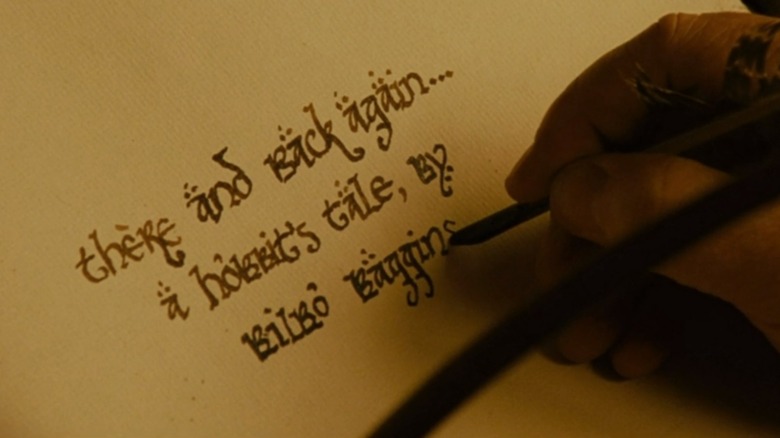The Writers Guild Of America Could Expand Screen Credit Eligibility - Here's What That Means
Change is in the air and it's coming for Hollywood, whether the industry is ready for it or not. Every single individual who professes to love entertainment would be well-advised to keep a close eye on the possible IATSE strike (that acronym stands for International Alliance of Theatrical Stage Employees) that would disrupt production in a major way, in the hopes of getting production crews fair working conditions. This week's nearly unanimous strike authorization served its purpose perfectly, bringing AMPTP (the Alliance of Motion Picture and Television Producers) back to the negotiating table.
But amid all this contentious back-and-forth, there's another important topic that is currently being proposed among the Writers Guild of America (WGA): the use of an "Additional Literary Material" credit for writers who would otherwise be left out of the accreditation process entirely. If authorized, this would have a number of ramifications for how writers are compensated, publicly recognized for their work, and given writing opportunities in the future.
Credit Where It's Due
Although audiences are rarely given reason to think about it, the process of receiving credits on a feature film in Hollywood can be a fraught, painful, and sometimes maddeningly arbitrary experience for screenwriters. Current WGA rules may seem specific and straightforward enough on paper, but applying these standards in practice when taken to an arbitration board is something else entirely.
In arbitration, appointed individuals have to do their best to figure out whether, say, one writer's contribution to a final shooting script amounts to more than 33% in order to receive screenplay credit. The added complication of multiple drafts with several different writers can lead to some wacky crediting, as seen with Marvel's "Eternals." As you might imagine, things can get pretty messy when a panel of arbitrators with different perspectives and opinions are holding the fate of a writer's credit in their hands.
According to Deadline, however, this process could very well be in for a major adjustment. The WGA is currently holding a referendum over introducing an "Additional Literary Material" credit that would, by all accounts, open up a new path to accreditation for hundreds of writers who currently are ineligible. In a letter to membership, the WGA Screen Credits Review Committee noted that:
Currently, many screenwriters who have worked for weeks or months on a project do not receive any on-screen credit, nor are they listed in online databases. By comparison, every crew member — even someone who works for only one day — will see their names in the end credits and on IMDb. In television, writers' names appear on all episodes on which they are employed. The more exclusionary standard for feature writers often results in 'résumé gaps' and empty IMDb pages that may not accurately reflect a screenwriter's career.
The approval of this new credit would not be for the purposes of establishing authorship of a particular script, however — according to the Guild, it would "denote employment or sale of material," an important distinction that factors into how writers would be compensated for their work. The usual "Written By" and "Screenplay By" credits would remain unchanged, but the basics of this proposal would be as follows:
- The words 'writer' and 'written' would not appear in the new end credit.
- The traditionally credited writer(s) — the 'by' writers — would continue to receive all the residuals.
- The placement of the new end credit would be distanced from the main writing credit.
- Only traditionally credited writers would have their names appear in advertising and publicity, participate in publicity events, and be eligible for awards and script publication fees.
Writers React
Unsurprisingly, established and up-and-coming writers throughout the industry quickly took to social media to weigh in and encourage others to vote on this important issue. C. Robert Cargill, a credited writer on movies such as "Sinister," "Doctor Strange," and the upcoming "Black Phone," laid out how this proposal would greatly benefit writers of all stripes:
"You can work on a set for a day and receive credit for that film. But you can write on a film for a year and not get any credit at all. I urge you to consider voting YES on the Additional Literary Material credit. Writers deserve their credit for time spent. This will be a huge boon for young writers who get replaced early in the process and rewritten to the point they get no credit. It will also give talented script doctors their due. Even unused drafts of a script impact the final product."
Dan Hernandez ("Pokémon Detective Pikachu," "The Addams Family 2") also tweeted out his thoughts, emphasizing the job opportunities that would be afforded for writers who are properly recognized for the work they put into a given script:
"I'm 100% for adopting the proposed WGA "Additional Literary Material" credit. It's absurd writers can contribute to a movie and receive NO CREDIT. There are big movies I've worked on I would love people to know about, not as ego, but as a track record that yields more work!"
If approved, this credit would not retroactively cover any previous films, and would take effect after December 31, 2021.


